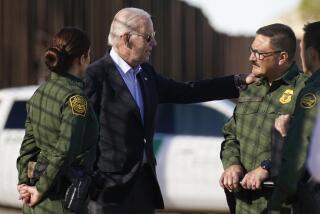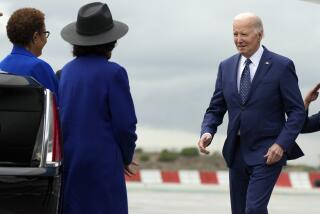U.S., Canada Agree to Tighten Border
WASHINGTON — U.S. and Canadian officials unveiled a joint plan Monday to tighten security along their lightly guarded 4,000-mile continental border while also working together more closely to stop terrorists from moving to North America.
The announcement came one day after the Justice Department released details of a related initiative to protect the traditionally relaxed boundary with an influx of 400 National Guard troops, helicopters and intelligence personnel.
Under Monday’s accord, U.S. and Canadian officials pledged to coordinate their visa policies, increase the use of binational law enforcement teams at the border, jointly train airline personnel and expand their sharing of intelligence.
“The United States and Canada have a fateful choice to make,” Atty. Gen. John Ashcroft said at a signing ceremony in the Canadian capital of Ottawa. “Either we will stand together to combat terrorism or we will fall together to those who hate our freedom and seek to see our freedom, liberty and the kind of integrity and dignity we accord to individual citizens in our nations extinguished.”
For years, the United States has focused its law-enforcement and security efforts on its southern border, seeking to stop the flow of drugs and illegal immigrants from Mexico, while long sections of its northern boundary were left virtually unguarded.
None of the Sept. 11 hijackers is known to have used Canada as a back door into the United States. But the openness of the Canadian border has concerned U.S. law enforcement officials for years.
As many as 50 terrorist organizations have a presence in Canada, according to intelligence officials of that country, which is known for its liberal policy of political asylum. Canadian politicians have said they are vigilant against terrorism and on Monday pointed out that they have committed $280 million to anti-terrorism efforts since Sept. 11.
The purpose of the accord is to “keep our common border secure and accessible,” said Canadian Deputy Prime Minister Herbert Gray.
Indeed, both nations have worked hard to maintain a balance between security needs and accessibility for trade and travel. Two-way trade across the border totals $1.3 billion in commerce every day, with 30% of that related to the auto industry.
Lines of cars waiting to enter the United States from Canada grew as long as 17 miles in the first hours after the Sept. 11 attacks, as U.S. officials imposed wartime scrutiny of vehicles. Estimates of delays reached 15 hours at the bustling entry points between Detroit and Windsor, Ontario. The gridlock threatened to wreak havoc in the auto industry and border-area economies.
“There were a lot of things in the congestion around the border that hurt both nations,” Ashcroft said Sunday. “We don’t want to be shutting down our automotive industry because we don’t have a fast enough inspection process.”
Whether the new security efforts threaten to create new traffic jams was not clear Monday. But the post-Sept. 11 traffic chaos eased after the Customs Service moved some of its inspectors from the southwest border to Canada and Michigan Gov. John Engler deployed National Guard troops to the Detroit-area crossing.
Those changes gradually restored some normality to the border crossing process, said Theresa Brown, manager of labor and immigration policy at the U.S. Chamber of Commerce.
A coalition of Canadian business groups released a report Monday urging government officials both to increase security and maintain the flow of commerce at the border.
“If there’s more people assisting with the inspections process, they can inspect more people per hour. They can go faster,” Brown said. “If that’s the case, it’s a good thing.”
As some see it, Canada’s recent history underscores the importance of more thorough security checks to stop terrorists from trying to enter the United States.
In recent years, French-speaking Quebec became a popular destination for French-speaking North Africans--notably Algerians--who were seeking haven from political and religious violence at home. Canadian immigration laws also extended special protection to those, including immigration violators, who faced dangerous or inhumane treatment if deported.
According to U.S. and French officials, Canada’s Algerian community became a breeding ground for recruits of Osama bin Laden. Counter-terrorism officials in Washington and Paris, meanwhile, objected to what some regarded as a sanctuary for terrorists in Canada.
In 1999, when French magistrate Jean-Louis Bruguierre was investigating an Algerian terrorist network linked to Bin Laden, Canadian officials initially resisted his request that the police search and track Algerian suspects in Montreal. Eventually, Canada agreed to cooperate, and officials helped uncover a Montreal terror cell with links to Al Qaeda training camps in Afghanistan.
That same year, U.S. Customs officials arrested Algerian national Ahmed Ressam at the Washington state border with a carload of explosives. Ressam, a member of that same Montreal terrorist cell, was convicted of plotting to bomb Los Angeles International Airport.
In the immediate aftermath of Ressam’s arrest, governments on both sides of the border acted to improve security and counter-terrorism operations. Canada allocated $1.5 billion, and President Clinton ordered federal agencies to devise a comprehensive counter-terrorism plan for the border.
Monday’s accord provides for a broad range of added cooperation against terrorist infiltration of North America and terrorist movements across the U.S.-Canadian border.
U.S. officials agreed to supply the Royal Canadian Mounted Police with equipment and training to link them with the FBI’s database of digitized fingerprints. The United States also agreed to include Canadian officials in their efforts to track foreign terrorists. The nations said they would work to develop common biometric technology that can be used to identify with near certainty unique physical traits of travelers, and to increase the number of immigration officers stationed overseas, where law enforcement can intercept passengers before they reach North America.
Both nations “are committed to pulling together on security issues that affect the safety of all our citizens,” Canada’s solicitor general, Lawrence MacAulay, said in a statement.
Times staff writers William C. Rempel in Los Angeles and Lionel Perron in Toronto contributed to this report.
More to Read
Sign up for Essential California
The most important California stories and recommendations in your inbox every morning.
You may occasionally receive promotional content from the Los Angeles Times.










